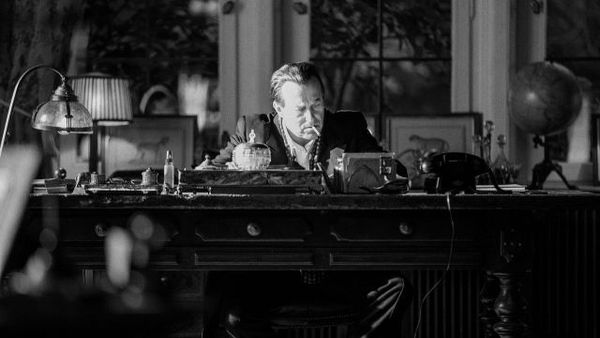Eye For Film >> Movies >> Fritz Lang (2016) Film Review
Fritz Lang
Reviewed by: Jennie Kermode

Few film industry figures have been as influential yet remained as mysterious as Fritz Lang, the master of German Expressionism who made Metropolis, then the most expensive film in history, before moving on to more intimate, differently powerful films. Rather in the vein of Fur - An Imaginary Portrait of Diane Arbus (though considerably darker), Gordian Maugg's film uses a heavily fictionalised narrative related to the director's work to explore a real life mystery in his personal life. It premièred before a friendly crowd at Fantasia but, despite its obscure themes, may be weighty enough to enjoy success of general release.
Between 1923 and 1930, the city of Düsseldorf was terrorised by a prolific serial killer who also left a number of living but mutilated victims in his wake. This was Peter Kürten, sometimes known as the Vampire of Düsseldorf; along with Fritz Haarmann (the Vampire of Hanover) and Carl Großmann (the cannibalistic Berlin Butcher), he would become the inspiration for Lang's chilling masterpiece, M. In this take on the story, Lang (Heino Ferch) becomes obsessed by the Düsseldorf killings and uses his friendship with real-life police inspector Ernst Gennat (Thomas Thieme) as a means of getting close to the evidence - and to a witness (played by Lisa Friederich) who catches his eye.

Here things become more complicated. Friederich also plays Lang's first wife (or partner - whether or not they were legally married is a matter of dispute, a detail set aside here), Lily Latte. Lily (here called Lisa) died of a gunshot wound around the time that Lang became close to Thea von Harbou (Johanna Gastdorf), the writer and actress whom he would go on to marry and collaborate with over many years. As we follow Lang's attempts to understand more about what's happening in Düsseldorf, we see repeated flashbacks in which Lily discovers Lang and von Harbou together. Did she kill herself in response? Did he kill her? The question hangs over the film like one of Lang's trademark shadows.
It's not the only inference of similarity between the filmmaker and the serial killer. Lang was known as something of a tyrant (he famously pushed Peter Lorre down a flight of stairs to give him the appearance he wanted for a key scene in M), and Maugg makes no attempt to conceal or apologise for that side of his personality. In an early scene, we see him engaged in a brutal, hastily negotiated act with a sex worker; almost at the same time, we see Kürten (Samuel Finzi) taking one of his victims to a park and stabbing her repeatedly with a pair of scissors. Later, having obtained the map the killer sent to police, Lang visits the site of her grave, imagining her in it - something Kürten did repeatedly with several of his victims. There's a sense that the two are shadowing one another, separated by something thin, insubstantial. In a later conversation, Kürten will talk about the artistic ambitions thwarted by his abusive father. Again, this has roots in reality, but is Maugg implying that Lang, had he not become successful in cinema, might have become a monster of the same type?
In telling this tale, Maugg illustrates his own command of the Expressionist form, an approach that is at its most delightful when scenes from M are spliced into the narrative. There are a plethora of obscure in-jokes here which will delight fans of the master's work; it's not necessary to catch them, but doing so adds a blackly comic aspect to a narrative that is otherwise predominantly grim. Intermittent references to Nazism give the Düsseldorf murders a premonitory quality and will remind some viewers of Michael Haneke's The White Ribbon. Kürten's insistence that his actions were justified by the various forms of mistreatment he suffered in his life echo the line Hitler was using at the time in reference to the Treaty of Versailles.
Heino Ferch, who masters the famous monocle with apparent ease, makes Lang a brooding, disturbing figure, but gives him enough humanity to countrpoint Finzi's psychologically distanced Kürten. He also makes him sufficiently intriguing to hold the viewer's attention throughout in a film that offers no easy answers and poses some uncomfortable questions.
Reviewed on: 28 Jul 2017















